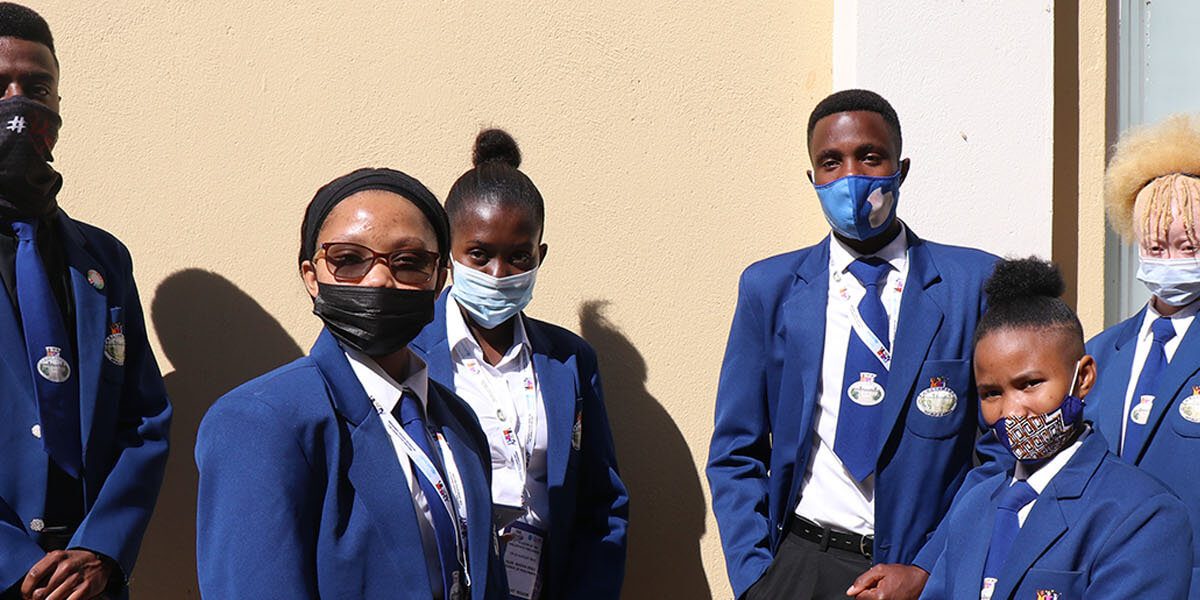Story by Benisia Nghiivali and Paulina Ndalikokule

Members of the 5th Children’s Parliament who attended the session in the person
Windhoek- The National Assembly, in collaboration with UNICEF, convened a special session for Members of the 5th Children’s Parliament on Friday, which provided crucial input and assessment of the implementation of the Sustainable Development Goals (SDGs) in Namibia.
The session, which was attended virtually and in person by members of the Children’s Parliament from all fourteen regions, discussed and presented motions on all SDGs.
The speaker of the National Assembly, Hon Prof Peter Katjavivi, emphasized in his keynote address that the Children’s Parliament is an essential voice for Namibian children’s freedom of movement and rights.
He stated that the government and other private stakeholders have a responsibility to listen to the child MPs’ comments and recommendations.
“We look forward to your recommendations and will ensure that they are channeled through to the relevant institutions both in government, the private sector and civil society, to ensure that we are inclusive in our policies and development agenda,” said Hon Katjavivi.
He added that the National Planning Commission is conducting more consultations on the implementation of the SDGs, and that parliament, as the legislative and oversight branch of the government, has also participated through various platforms to ensure a comprehensive overview in the report on Namibia’s progress on the SDGs.
“Just recently, the National Assembly through its membership of the Inter Parliamentary Union Standing Committee on UN Affairs, submitted its response on Parliamentary Engagement to the Voluntary National Assessment of SDG,” he said.
The Speaker said that, Parliament and UNICEF plan to form a Parliamentary Select Committee on the SDGs, which will bring together the Chairpersons of all of the National Assembly’s Parliamentary Standing Committees to develop better coordination and organization for Standing Committees perform their oversight functions in line with the SDGs’ goals.
The UNICEF representative to Namibia, Rachel Odede in her virtual address said that Namibia is one of the countries that has made great progress for its children, particularly in light of the SDGs.
She said that the session is one of the highlights of UNICEF’s work in Namibia, and that it demonstrates Namibia’s dedication to child engagement.
“We all know that young people first and foremost have a fundamental right to participate and engage meaningfully in society. Our meeting here today, is an encouraging example – showcasing that when given the conducive environment, young people like yourself can use these skills to increase accountability of governments and corporations,” Odede said.
In his welcoming remarks, the Deputy Chairperson of the Whole House Committee of the Children’s Parliament, Hon Rivaldo Kavanga, said that their debate aimed to air the voices of children’s demands in order to provide recommendations that would bring positive changes and opportunities to children and the country.
All United Nations Member States approved the Sustainable Development Goals in 2015 to eradicate poverty, reduce inequality, and develop more peaceful prosperous societies by 2030.
According to UN, and as part of its follow-up and review mechanisms, the 2030 Agenda for Sustainable Development encourages member states to conduct regular and inclusive reviews of progress at the national and sub-national levels, which are country-led and country-driven.
UN emphasizes that the voluntary national reviews (VNRs) aim to facilitate the sharing of experiences, including successes, challenges and lessons learned, with a view to accelerating the implementation of the 2030 Agenda. The VNRs also seek to strengthen policies and institutions of governments and to mobilize multi-stakeholder support and partnerships for the implementation of the Sustainable Development Goals.







